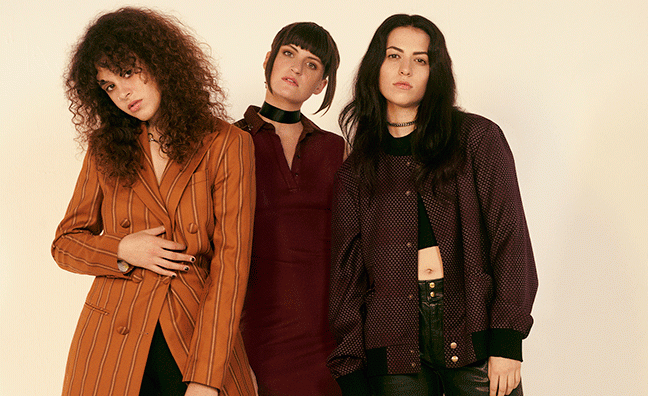It is an intoxicating, occasionally dizzying, experience to interview Muna. As the band – singer Katie Gavin and guitarists Josette Maskin and Naomi McPherson - pick away at plates of food at London’s Ace Hotel, Music Week is caught in their exuberant and intelligent three-way verbal crossfire.
They speak as only best friends do, more often than not finishing one another’s sentences. It’s not surprising, then, to find out that before becoming one of the most hotly-tipped groups of 2017, they were all friends at the University of Southern California.
It was there that Gavin decided to give music another shot after her first attempt went up in flames.
“I had some success when I was 17,” she recalls. “I had some attention on the internet and I reacted to it… not well. I felt like I needed to think way more deeply about why I wanted to do this and if I really had anything to say.”
After, she found musical and political kindred spirits in McPherson and Maskin, and the band they formed together certainly has a lot to say.
“We call ourselves a dark pop band,” clarifies McPherson. “We’re a pop band with a lot of spunk. We’ve got a lot of chutzpah and courage.”
Indeed, Muna’s debut album, About U, overdoses in courage and no more so than on Loudspeaker. At first, even Gavin’s bandmates did not realise that the song addresses her first-hand encounter with sexual assault. The lyric ‘Every time I don’t shut up is a revolution’ has struck a real chord.
“People have written [to] us the most about that,” says McPherson. “We’ve got a lot of letters from young women who’ve said, I experienced abuse or, I was raped, and this song helped me.”
“Even though the song comes from a place of sexual assault, being loud and unafraid to talk about something is who we are as a band,” says Maskin. “That song’s become what we represent.“
“I feel that femininity and vulnerability, and the other side being strength and bravery, is woven into all of our songs,” says Gavin.
Another example is I Know A Place. A celebratory song inspired by the legalisation of gay marriage in America it has, with its chorus of ‘I know a place we can go, where everyone gonna lay down their weapon’, taken on an ominous new meaning after the 2016 shootings that left 49 people dead at Orlando’s gay nightclub Pulse.
“It’s just sort of changed,” reflects McPherson. “I think that brought it home for a lot of people: that we’re still physically in danger to express ourselves differently, or to have a different sexuality.”
Muna are a band actively trying to tackle traumatic issues such as this publicly. To date, the biggest moment of their career was a show-stealing stint on Jimmy Kimmel where Gavin added the lyrics, ‘He’s not my leader, even if he’s my President’ to I Know A Place.
“The way that Katie did it wasn’t just a, Fuck you,” says Maskin. “She did it in such an artful way.”
At this point Maskin gets a little misty-eyed while expressing her admiration for Muna’s singer.
“I wasn’t really speaking to Donald Trump at all,” offers Gavin. “I was really trying to be the musical equivalent of the signs I see going up that say, I’m happy my neighbour is Muslim.
I feel that message is really beautiful because it’s productive - you’ve added love to the equation.”
And if one thing is clear in 2017, it’s that the love Muna are emitting is being reciprocated.









